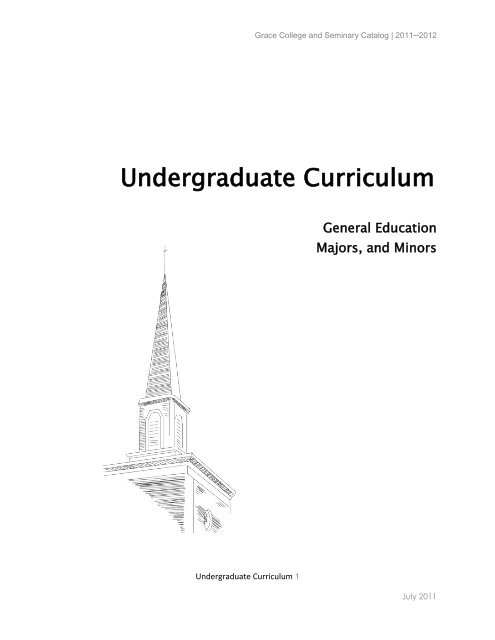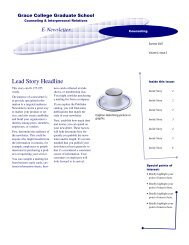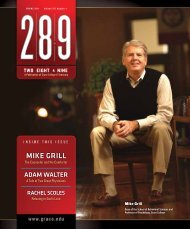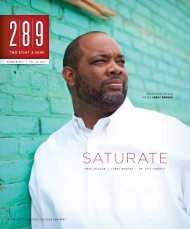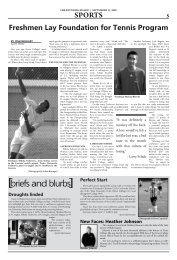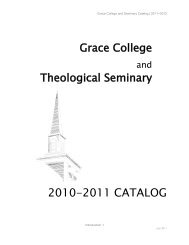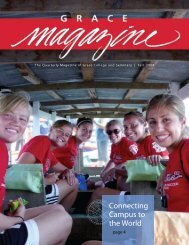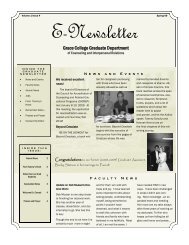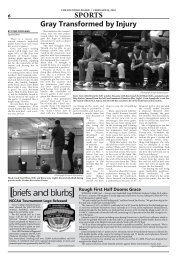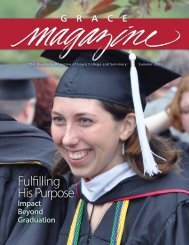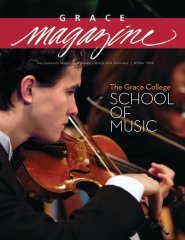Undergraduate Curriculum - Grace College and Seminary
Undergraduate Curriculum - Grace College and Seminary
Undergraduate Curriculum - Grace College and Seminary
Create successful ePaper yourself
Turn your PDF publications into a flip-book with our unique Google optimized e-Paper software.
<strong>Undergraduate</strong> <strong>Curriculum</strong> 1<br />
<strong>Grace</strong> <strong>College</strong> <strong>and</strong> <strong>Seminary</strong> Catalog | 2011–2012<br />
<strong>Undergraduate</strong> <strong>Curriculum</strong><br />
General Education<br />
Majors, <strong>and</strong> Minors<br />
July 2011
<strong>Undergraduate</strong> <strong>Curriculum</strong> 2<br />
<strong>Grace</strong> <strong>College</strong> <strong>and</strong> <strong>Seminary</strong> Catalog | 2011–2012<br />
PHILOSOPHY OF EDUCATION OF GRACE COLLEGE FACULTY<br />
The following Philosophy of Education was adopted by the faculty of <strong>Grace</strong><br />
<strong>College</strong> <strong>and</strong> Theological <strong>Seminary</strong> on April 7, 2010.<br />
As faculty members at <strong>Grace</strong> <strong>and</strong> individuals who are committed to a life of<br />
worship <strong>and</strong> spiritual growth, we actively look for reflective <strong>and</strong> practical ways<br />
the Christian faith intersects with our disciplines. 1 The integration of faith <strong>and</strong><br />
learning is based on the shared underst<strong>and</strong>ing that our faith “sacralizes” the<br />
pursuits of the Christian academician. That is, to the extent to which we do our<br />
work consciously as Christians, our professional lives become an offering of<br />
worship to God, <strong>and</strong> our faith “gives the questions we struggle within our work<br />
<strong>and</strong> in our lives larger significance.” 2 In other words, we are whole individuals<br />
<strong>and</strong> recognize the deficiency of a compartmentalized life. 3 Based on this<br />
foundation, our faith informs our work <strong>and</strong> makes it distinctive. 4 This<br />
distinctiveness may be further enhanced by the richness of our <strong>Grace</strong> Brethren<br />
heritage, which is rooted in the Pietist, Anabaptist, <strong>and</strong> Evangelical traditions,<br />
<strong>and</strong> we value the contributions these historical streams have to offer. 5<br />
As we strive for greater integration of faith <strong>and</strong> learning, our Christian faith<br />
prompts us to facilitate a rich sense of collegiality <strong>and</strong> community among<br />
faculty <strong>and</strong> students. 6 This is largely made possible through the fruit of the spirit.<br />
Humility prods us to consider our own biases <strong>and</strong> presuppositions. It calls us to<br />
listen to competing voices <strong>and</strong> perform our work in dialogue with colleagues<br />
<strong>and</strong> others within the broader discipline. Integrity requires that we accurately<br />
represent the views of others, resisting generalizations <strong>and</strong> caricatures. It also<br />
requires that we strive for Christian excellence in all that we do, maintaining the<br />
highest st<strong>and</strong>ards of professionalism. Love prompts us to encourage <strong>and</strong><br />
1 See Richard T. Hughes, How Christian Faith Can Sustain the Life of the Mind (Gr<strong>and</strong> Rapids: Eerdman’s<br />
Publishing Co., 2001) <strong>and</strong> Arthur F. Holmes, The Idea of a Christian <strong>College</strong> (Gr<strong>and</strong> Rapids: Eerdmans, 1987).<br />
Holmes writes (46), “Integration should be seen not as an achievement or a position but as an intellectual<br />
activity that goes on as long as we keep learning anything at all.”<br />
2 Robert Wuthnow, “Living the Question,” in Christianity in the Twenty-First Century: Reflections on the<br />
Challenges Ahead (New York: Oxford Univ. Press, 1993) 211-112, quoted in George M. Marsden, The<br />
Outrageous Idea of Christian Scholarship (New York, Oxford Univ. Press, 1997) 65.<br />
3 On living an integrated Christian life, see <strong>Grace</strong> Brethren author Kary Oberbrunner, The Fine Line: Reenvisioning<br />
the Gap between Christ <strong>and</strong> Culture (Zondervan, 2009).<br />
4 For more on Christian distinctiveness, consult Marsden, Outrageous Idea, 68-70.<br />
5 For examples of how others within the Anabaptist tradition have wrestled with the integration of faith <strong>and</strong><br />
learning, see J. Denny Weaver, <strong>and</strong> Gerald Biesecker Mast, eds. Teaching Peace: Nonviolence <strong>and</strong> the<br />
Liberal Arts (San Antonio: Rowman <strong>and</strong> Littlefield Publishers, Inc., 2003) <strong>and</strong> David Weaver-Zercher, ed.,<br />
Minding the Church: Scholarship in the Anabaptist Tradition.<br />
6 On the important link between learning <strong>and</strong> Christian community, See Claudia Beversluis, “Community as<br />
<strong>Curriculum</strong>.” Council for Christian <strong>College</strong>s <strong>and</strong> Universities. Online Resource Center<br />
(http://www.cccu.org/resourcecenter). Consult as well, Holmes chapter seven, “<strong>College</strong> as Community” in,<br />
Idea of a Christian <strong>College</strong>, 77-85.<br />
July 2011
<strong>Undergraduate</strong> <strong>Curriculum</strong> 3<br />
<strong>Grace</strong> <strong>College</strong> <strong>and</strong> <strong>Seminary</strong> Catalog | 2011–2012<br />
challenge each other as faculty members while caring for <strong>and</strong> serving our<br />
students. In an atmosphere permeated by the fruit of the spirit, our community<br />
will be a grace-filled place for us <strong>and</strong> our students to think critically, ask<br />
questions, <strong>and</strong> wrestle with the challenges of our world.<br />
God has called us to be a certain kind of people (BEING), for example, humane,<br />
communal, compassionate, redemptive, honest, just, hard working, etc. Further,<br />
God has called us to a life of learning <strong>and</strong> has invested us with the requisite skills<br />
<strong>and</strong> resources to learn (KNOWING), such as the mind <strong>and</strong> its cognitive<br />
capacities, the Scriptures, academic institutions, life experiences, peoples <strong>and</strong><br />
nations, etc. Finally, God has asked us to convert our being <strong>and</strong> knowing into<br />
service to others (DOING) as a way of expressing our love for <strong>and</strong> service to him.<br />
Therefore, <strong>Grace</strong> <strong>College</strong> <strong>and</strong> <strong>Grace</strong> Theological <strong>Seminary</strong> <strong>and</strong> their faculties<br />
are committed to integrated learning as a necessary component for<br />
empowering people to create lives that are whole, full, balanced, <strong>and</strong><br />
rewarding. 7<br />
There are a myriad of specific ways to accomplish the integration of faith <strong>and</strong><br />
learning in our study <strong>and</strong> in our teaching. They will vary depending on the<br />
context <strong>and</strong> discipline, but will always move beyond mere indoctrination. 8 At<br />
times, they may be of a reflective nature, having more to do with the questions<br />
that we ask <strong>and</strong> less about our conclusions. We might ask ourselves <strong>and</strong> our<br />
students, “How is the underst<strong>and</strong>ing that God created <strong>and</strong> sustains the world<br />
relevant to the material in question?” or “How does my belief in the fallen nature<br />
of human beings affect my world view?” or “How does the belief that all of<br />
humanity is loved <strong>and</strong> valued by God influence the way I consider those of<br />
other cultures?” 9 Other times, the integration of faith <strong>and</strong> learning will be of a<br />
more applied nature. 10 This will happen in many ways, not only in the classroom,<br />
but also as we mentor <strong>and</strong> advise students. We may prod ourselves <strong>and</strong> our<br />
7 From, Forbes, et. al., “Philosophy of Liberal Education,” Appendix C.<br />
8 According to Arthur Holmes (Idea of a Christian <strong>College</strong>, 46) “prepackaged answers” will never satisfy<br />
inquiring minds. “Students need rather to gain a realistic look at life <strong>and</strong> to discover for themselves the<br />
questions that confront us. They need to work their way painfully through the maze of alternative ideas <strong>and</strong><br />
arguments while finding out how the Christian faith speaks to such matters. They need a teacher as a<br />
catalyst <strong>and</strong> guide, one who has struggled <strong>and</strong> is struggling with similar questions <strong>and</strong> knows some of the<br />
pertinent materials <strong>and</strong> procedures. They need to be exposed to the frontiers of learning where problems<br />
are still not fully formulated <strong>and</strong> knowledge is exploding, <strong>and</strong> where by the very nature of things<br />
indoctrination is impossible.”<br />
9 On the significance <strong>and</strong> usefulness of theological questions within the context of Christian higher<br />
education, see Denise Lardner Carmody, Organizing a Christian Mind (Valley Forge, PA, Trinity Press<br />
International, 1996).<br />
10 George Marsden observes that faith can <strong>and</strong> should be integrated within even the most applied<br />
disciplines. He writes, “Even mathematicians or technical scientists will be able to point out some faithrelated<br />
considerations that have relevance to the foundational questions affecting the frameworks of their<br />
disciplines or the application of their work. It simply does not follow that, because there is no special<br />
Christian view of photosynthesis, there is therefore not a Christian view of biology.”<br />
July 2011
<strong>Undergraduate</strong> <strong>Curriculum</strong> 4<br />
<strong>Grace</strong> <strong>College</strong> <strong>and</strong> <strong>Seminary</strong> Catalog | 2011–2012<br />
students to consider ethical questions related to medical, scientific, or business<br />
practice. We may bring discussions of justice <strong>and</strong> caring for the oppressed into<br />
our classrooms <strong>and</strong> offices. We will no doubt consider specific portions of the<br />
Bible. And we may engage students in questions concerning the most effective<br />
ways of ministering, expressing themselves artistically, or serving Christ in local<br />
industries or within a chosen field. 11<br />
GENERAL EDUCATION<br />
At the heart of a <strong>Grace</strong> education are academically challenging courses that<br />
are specifically designed to foster a thirst for character, competence, <strong>and</strong><br />
service within the hearts <strong>and</strong> minds of our students. Every student at <strong>Grace</strong><br />
completes a series of general education courses, called the <strong>Grace</strong> Core <strong>and</strong><br />
thus enjoys a common experience that stretches across all the disciplines.<br />
Explicitly taught from a liberal arts approach, these courses are driven by the<br />
mission <strong>and</strong> evangelical heritage of the college, <strong>and</strong> have been created<br />
around four key human relationships: with God, with others, with self, <strong>and</strong> with<br />
the world, which includes both cultures <strong>and</strong> the environment.<br />
We believe that worshiping Christ, following His Calling, connecting with others,<br />
<strong>and</strong> engaging His world are the key to unlocking an academic experience that<br />
strengthens character, sharpens competence, <strong>and</strong> prepares for service.<br />
Character is the sum of distinctive dispositions, traits, qualities, attributes, <strong>and</strong><br />
behaviors that constitute the nature of an individual or community. People of<br />
good character are marked by a desire to be learners. The goal of a <strong>Grace</strong><br />
<strong>College</strong> education is to create people of deeper substance who underst<strong>and</strong><br />
<strong>and</strong> desire the more noble <strong>and</strong> healthy values. They are able to make<br />
discriminating judgments between truth <strong>and</strong> error, merit <strong>and</strong> demerit, the<br />
substantial <strong>and</strong> superficial. They possess a developing sense of self <strong>and</strong> place in<br />
God’s world <strong>and</strong> purpose. They are people who have maturing skills <strong>and</strong> a<br />
growing sense of confidence that they can contribute <strong>and</strong> make a positive<br />
difference. People of strong character appreciate (give place to) <strong>and</strong> engage<br />
(think through, even debate) the perennial <strong>and</strong> often controversial questions of<br />
life in a civil <strong>and</strong> reasonable way. People of character possess an elevated work<br />
ethic, care about workmanship, <strong>and</strong> are committed to a productive life, careful<br />
performance, <strong>and</strong> excellent products. As Christians, we best demonstrate this<br />
character when we live intentionally <strong>and</strong> consistently through our calling <strong>and</strong><br />
11 For some practical examples from several <strong>Grace</strong> faculty members, of the way faith <strong>and</strong> learning might<br />
be integrated within a variety of disciplines, see James E. Bowling <strong>and</strong> Joel B. Curry, Values in a Christian<br />
Liberal Arts Education (Winona Lake, BMH Books, 1992).<br />
July 2011
<strong>Undergraduate</strong> <strong>Curriculum</strong> 5<br />
<strong>Grace</strong> <strong>College</strong> <strong>and</strong> <strong>Seminary</strong> Catalog | 2011–2012<br />
profession of faith <strong>and</strong> biblical/theological commitments. Therefore, the<br />
undergraduate curriculum at <strong>Grace</strong> is designed to strengthen character.<br />
Competence is the pursuit of proficiencies <strong>and</strong> credentials that enable one to<br />
be a contributing member of society. A competent person possesses the<br />
requisite capacities <strong>and</strong> skills essential to a personal, professional, <strong>and</strong><br />
community life. A competent person increases knowledge bases <strong>and</strong> sharpens<br />
abilities <strong>and</strong> dispositions to put this knowledge to use in productive ways. A<br />
person who is competent is one who can gather data, think, discern, analyze,<br />
synthesize, <strong>and</strong> create solutions to problems. Such a person is one who suspends<br />
personal prejudices, who uses wise judgment, <strong>and</strong> who negotiates the world of<br />
ideas, grasps issues, wrestles with argumentation, interprets <strong>and</strong> traces<br />
implications, <strong>and</strong> makes connections to others <strong>and</strong> their ideas <strong>and</strong><br />
expressions. A competent person is a literate person who is empowered to take<br />
in more <strong>and</strong> contribute more with his or her mind <strong>and</strong> life. A competent person is<br />
creative, enterprising, <strong>and</strong> confident -- one who exercises initiative, takes risks,<br />
exhibits leadership, <strong>and</strong> comm<strong>and</strong>s respect. A competent person is thoughtful,<br />
articulate, expressive, <strong>and</strong> able to communicate in knowledgeable <strong>and</strong><br />
persuasive ways. Such a person is one whose curiosity is wide ranging <strong>and</strong> one<br />
who can conduct a substantive conversation on a variety of subject matters,<br />
someone who is interesting to be around. Therefore, the <strong>Grace</strong> undergraduate<br />
education is designed to produce people who are sharpening their<br />
competence as persons, Christians, citizens, <strong>and</strong> professionals.<br />
Service is a central imperative of the Christian faith. It is the natural outgrowth of<br />
loving <strong>and</strong> worshiping God. It is an outcome of a life well-lived. People of<br />
character serve competently. One ought to use one’s personal <strong>and</strong> professional<br />
competencies to serve one another <strong>and</strong> the larger society, thus fulfilling one’s<br />
service to God. Learning for the purpose of service is an act of stewardship <strong>and</strong><br />
worship. Learning is a prerequisite that empowers service. A <strong>Grace</strong> education<br />
contributes to both the practical <strong>and</strong> moral dimensions of life. Practically, it<br />
empowers people to gain the proficiencies that make them marketable <strong>and</strong><br />
employable. One’s professional life produces the resources <strong>and</strong> contexts for<br />
service. However, this is not the total goal of education. Life is more than work<br />
for personal gain. The <strong>Grace</strong> education should inspire students to build lives <strong>and</strong><br />
careers that will be turned toward advancing the cause of the One whom we<br />
ultimately serve. The mode of Christian servanthood can be expressed in several<br />
specific imperatives, each located somewhere in the curricular <strong>and</strong> cocurricular<br />
educational activities (e.g., go make disciples, call God’s people to a<br />
renewed vision <strong>and</strong> energy to serve Christ <strong>and</strong> his kingdom, defend <strong>and</strong><br />
perpetuate the truth of God’s revelation, work for the moral health of society,<br />
<strong>and</strong> pursue peace <strong>and</strong> justice in the world). The investment of our time, skills,<br />
intellect, <strong>and</strong> energies will leave an effect on our families, communities, work<br />
July 2011
<strong>Undergraduate</strong> <strong>Curriculum</strong> 6<br />
<strong>Grace</strong> <strong>College</strong> <strong>and</strong> <strong>Seminary</strong> Catalog | 2011–2012<br />
places, churches, the market place, <strong>and</strong> all of society. Therefore, at <strong>Grace</strong>, we<br />
have an education designed to foster service. 12<br />
In summary, as faculty, we strive to do our work as faithful worshipers of God, to<br />
embody the Fruit of the Spirit, <strong>and</strong> to prod ourselves <strong>and</strong> our students to reflect<br />
on the ways our respective disciplines 13 intersect with the depths of the Christian<br />
faith. This is an issue of character that enhances competence <strong>and</strong> empowers us<br />
for service.<br />
General Education Components<br />
The general education curriculum consists of 45 hours of study. The curriculum is<br />
arranged around two major components: the <strong>Grace</strong> Core (39 hours) <strong>and</strong> the<br />
general education electives that distinguish the B.A. degree from the B.S.<br />
degree (6 hours).<br />
<strong>Grace</strong> Core Courses<br />
The <strong>Grace</strong> Core is composed of thirteen courses devised from program goals<br />
<strong>and</strong> outcomes that emphasize or begin with one of the following four<br />
relationships <strong>and</strong> integrate additional relationships in substantial ways.<br />
Worshiping Christ (Relationship to God)<br />
1. BIB105 Exploring the Bible<br />
2. BIB201 Scripture <strong>and</strong> Interpretation<br />
3. BIB330 Essential Doctrinal Themes<br />
Following His Calling (Relationship to Self)<br />
4. FYE101 Freshman Foundations<br />
5. ECN300 Consumer Economics<br />
6. PHI301 Christianity <strong>and</strong> Critical Thinking<br />
Connecting with Others (Relationship to Others)<br />
7. COM110 Public Speaking<br />
8. ENG110 Effective Writing<br />
9. PSY120 Essentials of Behavioral Science<br />
Engaging His World (Relationship to the World <strong>and</strong> Environment)<br />
10. HIS 138 Contemporary America <strong>and</strong> the World<br />
12 The definitions of Character, Competence, <strong>and</strong> Service are from: Forbes, et. al.<br />
13 See James E. Bowling <strong>and</strong> Joel B. Curry.<br />
July 2011
11. HUM200 Global Perspectives<br />
12. HUM210 Creative Arts <strong>and</strong> Culture<br />
13. SCI200 Science Matters<br />
<strong>Undergraduate</strong> <strong>Curriculum</strong> 7<br />
<strong>Grace</strong> <strong>College</strong> <strong>and</strong> <strong>Seminary</strong> Catalog | 2011–2012<br />
Every student takes these courses, as they comprise the common <strong>Grace</strong><br />
experience the institution desires for undergraduate students. In some cases,<br />
transfer students may be granted exemptions depending on how transcripts are<br />
analyzed during the admissions process.<br />
Worshiping Christ (Relationship to God)<br />
BIB105 Exploring the Bible<br />
This course provides a survey of the biblical story in its progressive unfolding of<br />
the history of redemption within the framework of creation, fall, redemption,<br />
consummation. Attention is given to the literary, historical, cultural, <strong>and</strong><br />
theological dimensions of Scripture as it offers a metanarrative or “worldviewstory.”<br />
Emphasis is placed on the unity of Scripture as it reaches its fullness <strong>and</strong><br />
fulfillment in Christ, while at the same time recognizing key developments <strong>and</strong><br />
differences between the various chapters of the biblical storyline. Three Hours.<br />
BIB201 Scripture <strong>and</strong> Interpretation<br />
Foundational principles of effective Bible study will be applied for personal study<br />
<strong>and</strong> small group Bible study leadership. Observational skills of the English text will<br />
be developed through h<strong>and</strong>s-on activities <strong>and</strong> assignments. Hermeneutical<br />
principles will be applied to various biblical genres with the goal of equipping<br />
the learner to interpret the text based on its historical/cultural <strong>and</strong> literary<br />
context. Application of the meaning of the text for spiritual formation will be<br />
emphasized as well. Three Hours.<br />
BIB330 Essential Doctrinal Themes<br />
This course is designed to engage the student in the essential doctrines of the<br />
Christian Faith <strong>and</strong> to help them complete the desired transference from belief<br />
to conviction in their personal faith. The purpose of this class is to examine eight<br />
areas of theology in such a manner as to allow the learners to search the<br />
Scriptures so they can begin to articulate <strong>and</strong> defend what they believe about<br />
the Christian faith. Special attention will be given to helping the students grasp<br />
the historical doctrinal commitments of <strong>Grace</strong> <strong>College</strong> <strong>and</strong> <strong>Seminary</strong> by<br />
engaging students in class discussion around those commitments. Three Hours.<br />
Following His Calling (Relationship to Self)<br />
July 2011
<strong>Undergraduate</strong> <strong>Curriculum</strong> 8<br />
<strong>Grace</strong> <strong>College</strong> <strong>and</strong> <strong>Seminary</strong> Catalog | 2011–2012<br />
FYE101 Freshman Foundations<br />
This is a practical, academic course which is intended to prepare new students<br />
to engage in three key areas of their first-year transition into college:<br />
Underst<strong>and</strong>ing who we are, underst<strong>and</strong>ing who they are, <strong>and</strong> underst<strong>and</strong>ing<br />
our Call. This course is designed to make their years at <strong>Grace</strong> the best<br />
experience possible. This course will help students discover their God-given<br />
strengths, navigate through current college issues, <strong>and</strong> help the student better<br />
underst<strong>and</strong> what makes a Christian liberal arts education valuable. It will also<br />
introduce students to the value of service in the local community <strong>and</strong> introduce<br />
students to prospective departments <strong>and</strong> faculty within the institution, assisting in<br />
the selection process of choosing a major <strong>and</strong> a career. Three Hours.<br />
ECN300 Consumer Economics<br />
Consumer Economics is a course designed to prepare students to underst<strong>and</strong><br />
the economic system from a Biblical perspective <strong>and</strong> how it affects individuals<br />
as consumers, producers <strong>and</strong> citizens. Students will integrate knowledge, skills<br />
<strong>and</strong> practices required for management of resources in a technologically<br />
exp<strong>and</strong>ing global economy. Real world topics covered will include income,<br />
money management, spending <strong>and</strong> credit, as well as saving <strong>and</strong> investing.<br />
Core skills in decision making, problem solving, critical thinking, goal setting,<br />
management of multiple roles <strong>and</strong> using technology are integrated into the<br />
course content. Three Hours.<br />
PHI301 Christianity <strong>and</strong> Critical Thinking<br />
This course will critically examine the beliefs <strong>and</strong> presuppositions of philosophers<br />
<strong>and</strong> philosophies over the centuries <strong>and</strong> their impact on modern Christianity <strong>and</strong><br />
the Christian Worldview. A critical examination will begin by utilizing the lens of<br />
Scripture as the basis of truth in evaluating these beliefs. The application of that<br />
examination will be centered on the reasons for God as well as the nature of<br />
suffering <strong>and</strong> evil as learners are encouraged to formulate a biblically sound<br />
Christian Worldview. Three Hours.<br />
Connecting with Others (Relationship to Others)<br />
COM110 Public Speaking<br />
A study of communication theory as applicable to public speaking. Students<br />
explore the components of an effective speech, as well as current applications<br />
of speaking skills. Emphasis will be placed on practicing <strong>and</strong> displaying these<br />
skills in a laboratory setting. Three Hours, including lab.<br />
July 2011
<strong>Undergraduate</strong> <strong>Curriculum</strong> 9<br />
<strong>Grace</strong> <strong>College</strong> <strong>and</strong> <strong>Seminary</strong> Catalog | 2011–2012<br />
ENG110 Effective Writing<br />
The principles involved in writing clear expository, persuasive, <strong>and</strong> researched<br />
papers are studied <strong>and</strong> practiced. In addition, the English language is examined<br />
from a linguistic perspective. Three Hours.<br />
PSY120 Essentials of Behavioral Science<br />
This introductory course in Behavioral Sciences provides an opportunity to learn<br />
about the major behavioral science theories, concepts <strong>and</strong> its real life<br />
applications. This course will survey topics such as child development, parenting,<br />
gender differences, stress, self-care <strong>and</strong> abnormal behavior. Students will also<br />
be encouraged during this course to increase personal awareness of how<br />
cognitive <strong>and</strong> emotional factors influence behavior in a variety of social<br />
contexts. Additionally, this course will examine styles of relating as it pertains to<br />
employment, dating, marriage <strong>and</strong> family life. Three Hours.<br />
Engaging His World (Relationship to the World <strong>and</strong> the Environment)<br />
HIS138 Contemporary America <strong>and</strong> the World<br />
This course is a topical approach to the cultural history of the United States from<br />
the end of the Second World War to the present, with special emphasis on<br />
America’s role in global affairs. Students will not only gain a broad<br />
underst<strong>and</strong>ing of America’s place in recent world events but also a specialized<br />
knowledge of various relevant topics <strong>and</strong> their historical context. Topics covered<br />
in this class have included the Cold War, the 1960s, American evangelicalism,<br />
<strong>and</strong> terrorism. Three Hours.<br />
HUM200 Global Perspectives<br />
In this course, students engage divergent outlooks from around the world,<br />
grappling with cultural differences <strong>and</strong> presuppositions. Defining literary works,<br />
films <strong>and</strong> guest speakers from different continents set the stage for literary <strong>and</strong><br />
cultural discussions. This course will also provide a framework for underst<strong>and</strong>ing<br />
God’s heart for the nations, <strong>and</strong> will serve as the preparation for the Cross-<br />
Cultural Field Experience. Three Hours.<br />
Cross-Cultural Field Experience<br />
The lab component of Global Perspectives is a required cross-cultural field<br />
experience that all <strong>Grace</strong> <strong>College</strong> students must fulfill prior to graduation.<br />
Through this first-h<strong>and</strong> experience, students will have the opportunity to<br />
engage in a culture (in a global sense; i.e. different ethnicities or<br />
nationalities) other than their own for at least 7 days, <strong>and</strong> begin to apply<br />
learned concepts to a real-life situation.<br />
HUM201 Go<strong>Grace</strong> Trips<br />
July 2011
<strong>Undergraduate</strong> <strong>Curriculum</strong> 10<br />
<strong>Grace</strong> <strong>College</strong> <strong>and</strong> <strong>Seminary</strong> Catalog | 2011–2012<br />
Students selecting this option will choose from a number of<br />
domestic <strong>and</strong> international trips organized <strong>and</strong> administered by<br />
<strong>Grace</strong> <strong>College</strong>. Zero hours.<br />
HUM202 CCFE Independent Trips<br />
Students who select this option create their own International field<br />
experience in consultation with the Global Perspectives faculty.<br />
These experiences must be pre-approved <strong>and</strong> must last a minimum<br />
of 7 days. Students must complete a debriefing lab in the semester<br />
immediately following their trip. Zero hours.<br />
HUM203 Third Culture/International<br />
A course designed for bicultural individuals for whom the United<br />
States is a cross-cultural experience. Students explore some of the<br />
assumptions, values <strong>and</strong> beliefs that characterize the United States<br />
<strong>and</strong> compare those with other cultures. They also discover the third<br />
culture, as defined by Dr. Useem, “created, shared, <strong>and</strong> learned”<br />
by those who are from one culture <strong>and</strong> are in the process of<br />
relating to another. Fall A only. Zero hours.<br />
STA001-STA064 Study Abroad Programs<br />
Select majors require participation in the Study Abroad program to<br />
fulfill their program degree requirements. Consult the Study Abroad<br />
website for current listings. Twelve to Thirty Hours.<br />
HUM210 Creative Arts <strong>and</strong> Culture<br />
Through a global, thematic approach, this course explores the human<br />
phenomenon of creativity. Posing the question "Why creative arts?' this course<br />
focuses on exploring how culture <strong>and</strong> creativity reflect each other within the<br />
realm of visual <strong>and</strong> performing arts. Through themes of survival, religion, the<br />
state, <strong>and</strong> self, this course examines artists’ roles within cultures, the way art is<br />
made or performed, how meaning is derived, <strong>and</strong> how art is used, kept or<br />
destroyed. Required experiential activities for engaging in visual <strong>and</strong> performing<br />
arts include such things as attending museum exhibits, concerts or theatrical<br />
productions. Three Hours.<br />
SCI200 Science Matters<br />
Exploration of physical <strong>and</strong> biological details of nature with emphasis on science<br />
history, the creation worldview, <strong>and</strong> earth stewardship. A “h<strong>and</strong>s-on” approach<br />
is emphasized with activities <strong>and</strong> data analysis. Three Hours.<br />
STUDENT SUCCESS COURSEWORK<br />
July 2011
<strong>Undergraduate</strong> <strong>Curriculum</strong> 11<br />
<strong>Grace</strong> <strong>College</strong> <strong>and</strong> <strong>Seminary</strong> Catalog | 2011–2012<br />
Some students benefit from additional assistance to maximize their success in<br />
college-level courses. Based on their individual circumstances <strong>and</strong> st<strong>and</strong>ardized<br />
test scores, students may be enrolled in preparatory or pre-requisite course work,<br />
such as Academic Fundamentals for <strong>College</strong> or Principles of Writing. These<br />
courses do not fulfill the requirements of the Core. Generally, these courses also<br />
do not fulfill degree program requirements in majors or minors; however,<br />
students may be able to apply these courses to their major or minor if approved<br />
by the department as an open elective.<br />
GEN100 Academic Fundamentals for <strong>College</strong><br />
Through discussion, lectures, outside assignments, in-class learning<br />
experiences <strong>and</strong> guest speakers, students are introduced to the course<br />
philosophy, taught the basic skill sets crucial to success in life <strong>and</strong> school,<br />
<strong>and</strong> assisted in making connection with peers <strong>and</strong> faculty. The foundation<br />
of the course is based on goal setting <strong>and</strong> self-responsibility. These<br />
important principles are emphasized in each skill set. Three hours.<br />
ENG102 Principles of Writing<br />
A foundational college course in grammar <strong>and</strong> composition designed to<br />
help prepare those students who, on the basis of ACT <strong>and</strong> SAT verbal<br />
scores <strong>and</strong> high school English grades, are not prepared to succeed in<br />
ENG 110 Effective Writing. Grammar review, paragraph writing, <strong>and</strong> essay<br />
writing are studied <strong>and</strong> practiced. Three hours.<br />
APPLIED LEARNING<br />
Applied learning is a broad, creative education concept that demonstrates<br />
what students can do with what they know. It emphasizes commitment to<br />
analytic inquiry, active learning, real-world problem solving, <strong>and</strong> innovation. It<br />
may be demonstrated through traditional <strong>and</strong> non-traditional assignments, <strong>and</strong><br />
links knowledge <strong>and</strong>/or skills acquired in work, community, <strong>and</strong>/or research<br />
activities with knowledge acquired in one or more disciplines through a project,<br />
paper, or performance. Applied learning is a core element of an<br />
undergraduate’s experience at <strong>Grace</strong> <strong>College</strong>.<br />
Of the 120 credits needed for graduation, 12 credits will be designated as<br />
“applied learning” <strong>and</strong> may be fulfilled through a variety of experiences such as<br />
study abroad, student teaching, internships, research projects, lab work, or<br />
individually designed projects intended to fulfill the purpose of applied learning.<br />
Some applied learning credits are achieved by enrolling in courses in the major<br />
or minor that also have applied learning credits assigned to them. Other applied<br />
learning credits are discrete experiences or courses in which the student enrolls.<br />
July 2011
<strong>Undergraduate</strong> <strong>Curriculum</strong> 12<br />
<strong>Grace</strong> <strong>College</strong> <strong>and</strong> <strong>Seminary</strong> Catalog | 2011–2012<br />
Approved applied learning experiences are noted on check sheets <strong>and</strong><br />
available in the Registrar’s Offices. Students <strong>and</strong> faculty may submit to the<br />
Director of Applied Learning a proposal for an applied learning project that is<br />
individualized to a student’s interests <strong>and</strong> needs.<br />
UNDERGRADUATE DEGREE PROGRAMS<br />
Associate Degree in Nursing<br />
An associate degree in nursing is available through a combined <strong>Grace</strong> <strong>College</strong>/<br />
Bethel <strong>College</strong> nursing program. Two- <strong>and</strong> three-year ADN options are<br />
available. More information may be obtained from the Bethel nursing<br />
coordinator on the <strong>Grace</strong> <strong>College</strong> campus. Students enrolled in the nursing<br />
program are Bethel students enrolling in general education <strong>and</strong> cognates on<br />
the <strong>Grace</strong> <strong>College</strong> campus before officially enrolling in the Bethel nursing<br />
program.<br />
Associate of Arts<br />
An associate degree in general studies is available at the Henry <strong>and</strong> Frances<br />
Weber School at <strong>Grace</strong> <strong>College</strong> in its Ft. Wayne <strong>and</strong> Indianapolis locations. The<br />
curriculum is comprised of the <strong>Grace</strong> Core <strong>and</strong> additional courses in the liberal<br />
arts, which then enables students to easily pursue a bachelor’s degree.<br />
Associate of Science<br />
An associate degree is available in either Biblical Studies or Organizational<br />
Leadership through the Prison Extension Program only. The program consists of 60<br />
hours, including 27 hours of Bible <strong>and</strong> the balance in general education.<br />
Bachelor of Arts <strong>and</strong> Bachelor of Science<br />
<strong>Grace</strong> <strong>College</strong> offers a variety of majors leading to the Bachelor of Arts (B.A.)<br />
<strong>and</strong> the Bachelor of Science (B.S.) degrees. Most majors require a minor.<br />
Specific program requirements are available in the respective catalog section<br />
of each department, at the Registrar’s Office, <strong>and</strong> at The Learning Resource<br />
Center.<br />
In addition to the 39 credit hours of the <strong>Grace</strong> Core, students enroll in 6<br />
additional credit hours specific to the B.A. or the B.S. degree. Students who<br />
select a B.A. degree take 6 credits of a modern or ancient language. Students<br />
who select a B.S. degree take 6 credits of science, math, or social science<br />
outside their chosen discipline.<br />
July 2011
<strong>Undergraduate</strong> <strong>Curriculum</strong> 13<br />
<strong>Grace</strong> <strong>College</strong> <strong>and</strong> <strong>Seminary</strong> Catalog | 2011–2012<br />
The institutional requirement of at least 120 semester hours of course work<br />
leading to a B.A. or B.S. degree includes the successful completion of one major,<br />
one minor (if required), the <strong>Grace</strong> Core (39 credits), 6 credits specific to the B.A.<br />
or the B.S., <strong>and</strong> 12-credits of applied learning.<br />
Majors <strong>and</strong> minors are:<br />
Discipline BA BS Minor<br />
• Accounting/Business Administration X X X<br />
• Art X X X<br />
• Art Education (all grade)<br />
X<br />
• Behavioral Science<br />
X<br />
• Bible (second major only) X X<br />
• Biblical Languages<br />
X<br />
• Biblical Studies X X X<br />
• Biology X X X<br />
• Business<br />
X<br />
• Business Administration X X X<br />
• Business Education X X<br />
• Chemistry<br />
X<br />
• Communication, with tracks in:<br />
X<br />
• Communication Studies X X<br />
• Film Studies X X<br />
• Public Relations X X<br />
• Theatre X X<br />
• Counseling X X<br />
• Criminal Justice X X<br />
• Drawing <strong>and</strong> Painting X X X<br />
• Elementary Education X X<br />
• Engineering, with stems in: (with Trine University)<br />
• Biomedical<br />
X<br />
• Civil<br />
X<br />
• Mechanical<br />
X<br />
• Engineering Technology (with Trine University) X<br />
• English X<br />
X<br />
• English Education X<br />
• Environmental Biology X X<br />
• Environmental Science X X X<br />
• Environmental Studies X X<br />
• Finance/Business Administration X X<br />
July 2011
<strong>Undergraduate</strong> <strong>Curriculum</strong> 14<br />
<strong>Grace</strong> <strong>College</strong> <strong>and</strong> <strong>Seminary</strong> Catalog | 2011–2012<br />
Discipline BA BS Minor<br />
• Financial Planning/Business Administration X X<br />
• French X<br />
X<br />
• French Education X<br />
• General Business/Business Administration X X<br />
• General Science X X X<br />
• Geography<br />
X<br />
• Graphic Design X X X<br />
• History X X X<br />
• Illustration X X X<br />
• Information Systems X X<br />
• Intercultural Studies X X X<br />
• International Business/Business Administration X X X<br />
• International Languages X<br />
• Journalism X X X<br />
• Journalism Education X X<br />
• Liberal Arts<br />
X<br />
• Life Science Education X X<br />
• Management of Information Systems/Bus Admin X X X<br />
• Marketing/Business Administration X X X<br />
• Mathematics X X X<br />
• Mathematics Education X X<br />
• Nursing (RN to BSN, with Bethel <strong>College</strong>)<br />
X<br />
• Pedagogy<br />
X<br />
• Political Science X X X<br />
• Pre-Law (combined with any major)<br />
X<br />
• Psychology X X<br />
• Public History<br />
X<br />
• Social Studies Education X X<br />
• Sociology X X<br />
• Spanish X<br />
X<br />
• Spanish Education X<br />
• Special Education (see Teaching All Learners) X X<br />
• Sport Management X X X<br />
• Sport Management/Business Administration X X<br />
• Teaching All Learners (elem/mild intervention licensure) X X<br />
• TESOL (certificate)<br />
X<br />
• Web Design <strong>and</strong> Development X X<br />
• Youth Ministry X X X<br />
July 2011
Student Exchange Programs<br />
<strong>Undergraduate</strong> <strong>Curriculum</strong> 15<br />
<strong>Grace</strong> <strong>College</strong> <strong>and</strong> <strong>Seminary</strong> Catalog | 2011–2012<br />
<strong>Grace</strong> <strong>College</strong> students have the opportunity to study at international institutions<br />
with which <strong>Grace</strong> <strong>College</strong> has developed exchange agreements. Currently, an<br />
exchange program has been established with H<strong>and</strong>ong Global University in<br />
Pohang, South Korea, <strong>and</strong> conversations are underway with other universities for<br />
additional exchange programs.<br />
To be eligible to participate in an exchange program, students must be at least a<br />
sophomore, in good academic st<strong>and</strong>ing, meet all the general Study Abroad<br />
requirements, <strong>and</strong> meet any requirements set forth by the host institution.<br />
Costs for the various programs may vary depending on the details of each<br />
agreement, but generally students pay regular tuition to <strong>Grace</strong> <strong>College</strong>, <strong>and</strong> room<br />
<strong>and</strong> board to the host institution. In most cases, students may use their institutional<br />
aid irrespective of their major. All travel fees (passport, visas, airfare, etc) are the<br />
student’s responsibility.<br />
Classes taken at host institutions are posted to the transcript as <strong>Grace</strong> <strong>College</strong><br />
credits <strong>and</strong> applied toward the <strong>Grace</strong> Core or major requirements, given that the<br />
student has filled out the proper petitions, in consultation with his/her advisor, prior<br />
to participating in the exchange program.<br />
For more information about exchange programs contact the Global Initiatives<br />
office.<br />
Study Abroad Programs<br />
<strong>Grace</strong> <strong>College</strong> is vitally interested in encouraging students to exp<strong>and</strong> their global<br />
awareness. To enrich their cross-cultural experience, numerous opportunities are<br />
available for study abroad. These experiences are available through the Director of<br />
Global Initiatives for language <strong>and</strong> non-language majors <strong>and</strong> minors <strong>and</strong> for<br />
students planning cross-cultural experiences to meet their general education<br />
requirements for the Global Perspectives course. In addition to these programs,<br />
other cross-cultural opportunities are available through summer cross-cultural<br />
opportunities. Students are encouraged to take advantage of these experiences<br />
to broaden their global awareness.<br />
The Global Initiatives Office at <strong>Grace</strong> <strong>College</strong> coordinates cross-cultural<br />
experiences for both language <strong>and</strong> non-language majors.<br />
Study Abroad for Language Majors <strong>and</strong> Minors<br />
July 2011
<strong>Undergraduate</strong> <strong>Curriculum</strong> 16<br />
<strong>Grace</strong> <strong>College</strong> <strong>and</strong> <strong>Seminary</strong> Catalog | 2011–2012<br />
Because we believe immersion in the target culture <strong>and</strong> language is the<br />
greatest means of attaining proficiency, qualified language students study<br />
abroad during their sophomore or junior year to fulfill the requirements for a<br />
language major or minor.<br />
Through this cross-cultural experience, students learn to appreciate another part of<br />
the world. They are placed with a host family or in a residence, participate in the<br />
life of a church, <strong>and</strong> are enrolled in some of the world’s best-known universities with<br />
whom <strong>Grace</strong> <strong>College</strong> has transfer <strong>and</strong> credit agreements. By signing a language<br />
pledge, students commit to speak the target language throughout their<br />
experience <strong>and</strong>, therefore, attain near-native fluency by the end of the program.<br />
For their overseas experience, Spanish students have the choice of studying in<br />
the capital of Argentina, Buenos Aires, or in Madrid, Spain. The beautiful cities of<br />
Paris <strong>and</strong> Dijon are the choices our French students have in France.<br />
Study Abroad for Non-Language Majors<br />
Students who desire to study abroad where the instruction is in English may<br />
select from pre-approved study abroad programs such as the BestSemester<br />
Programs through the Council of Christian <strong>College</strong>s <strong>and</strong> Universities (CCCU) <strong>and</strong><br />
Arcadia.<br />
For further information regarding academic requirements, financial<br />
arrangements, <strong>and</strong> schedule planning, visit the Study Abroad page of the<br />
campus Web site or contact the Director of Global Initiatives.<br />
Pre-Professional Programs <strong>and</strong> Certificates<br />
Some disciplines offer pre-professional or certificate programs including the<br />
disciplines of English (a TESOL minor, including a certificate), political science<br />
(pre-law), <strong>and</strong> biology (e.g., pre-med, pre-veterinary, etc.). Details about these<br />
programs are available in the respective academic section of this catalog <strong>and</strong><br />
from the department.<br />
Pre-Law Program<br />
Students preparing for law school are encouraged to consider the pre-law<br />
program. Student may choose from a broad range of majors, will be assigned a<br />
pre-law advisor, may declare a pre-law minor, <strong>and</strong> will have internship<br />
possibilities. Further details are included under the Department of History <strong>and</strong><br />
Political Science, which administers this rigorous program.<br />
Pre-Professional Biology Programs<br />
The Department of Science <strong>and</strong> Mathematics manages pre-professional<br />
programs in dentistry, medicine, optometry, pharmacy, physician assistant,<br />
July 2011
<strong>Undergraduate</strong> <strong>Curriculum</strong> 17<br />
<strong>Grace</strong> <strong>College</strong> <strong>and</strong> <strong>Seminary</strong> Catalog | 2011–2012<br />
physical therapy, veterinary medicine along with a number of other less<br />
common professional programs.<br />
Students preparing for the study of dentistry, medicine, physician assistant <strong>and</strong><br />
physical therapy can usually meet the specific requirements for admission to<br />
their respective professional programs by pursuing a department major in<br />
biology (B.A. or B.S.). Students may major in any other discipline as long as they<br />
include in their course selection those courses required for admission by the<br />
professional programs for which they are seeking admission. The admission<br />
requirements for any professional program may be obtained online directly from<br />
the professional schools or from the <strong>Grace</strong> <strong>College</strong> Health Professions Advisor.<br />
<strong>Grace</strong> <strong>College</strong> has an articulation agreement with Southwest Baptist University<br />
whereby <strong>Grace</strong> pre-physical therapy students meeting certain course<br />
requirements will automatically receive preference points for admission to the<br />
Doctor of Physical Therapy Program at Southwest Baptist. Details may be<br />
obtained from the Health Professions Advisor.<br />
Students preparing for the study of pharmacy should pursue the department<br />
major in biology. It is prudent to identify the admission requirements of one or<br />
more specific colleges of pharmacy early in the advising process in order to<br />
plan the most desirable pre-professional programs since some pharmacy<br />
schools may admit students with less than four years of pre-professional work.<br />
Students preparing for the study of veterinary medicine may complete the specific<br />
requirements for most schools of veterinary medicine by majoring in biology <strong>and</strong><br />
including in their program those course requirements specified by the school of<br />
veterinary medicine for which they are applying. A list of the specific course<br />
requirements can be obtained from the Health Professions Advisor.<br />
Students preparing for careers in optometry or chiropractic medicine should<br />
plan on a department major in biology. However, since the admission<br />
requirements for those professional programs are quite diverse, it is important to<br />
meet with the Health Professions Advisor to identify them.<br />
Pre-<strong>Seminary</strong> Program Advanced St<strong>and</strong>ing<br />
<strong>Grace</strong> <strong>College</strong> students can gain advanced st<strong>and</strong>ing toward several masters<br />
programs at <strong>Grace</strong> Theological <strong>Seminary</strong> in the following ways:<br />
1. Greek <strong>and</strong> Hebrew language courses taken while a <strong>Grace</strong> <strong>College</strong> student<br />
are accepted by the seminary with all fees waived. However, the student<br />
must have earned a minimum grade of “B-” in each class.<br />
2. A student may gain additional hours of credit by testing. To qualify to take a<br />
test there must have been a similar course taken in the college <strong>and</strong> the<br />
minimum grade earned must be no less than “B-.” A list of courses available<br />
for testing can be obtained from the seminary office.<br />
July 2011
<strong>Undergraduate</strong> <strong>Curriculum</strong> 18<br />
<strong>Grace</strong> <strong>College</strong> <strong>and</strong> <strong>Seminary</strong> Catalog | 2011–2012<br />
3. Some courses are accepted without testing provided that the student has<br />
earned the minimum grade of “B-.”<br />
Maximum limits have been established for the various master’s programs in<br />
accordance with the seminary accreditation st<strong>and</strong>ards. More information about<br />
advanced st<strong>and</strong>ing may be obtained from the School of Ministry Studies or the<br />
student’s faculty advisor.<br />
TESOL Certificate<br />
The Languages, Literature, <strong>and</strong> Communication Department offers a minor that<br />
leads to a certificate for those who desire to teach English to speakers of other<br />
languages (TESOL). The certificate is targeted to adults <strong>and</strong> global ministry<br />
settings. It is not certifiable for teaching in state-accredited schools, nor is it a<br />
part of the programs in the School of Education. The certificate is only available<br />
as a minor. More information is available from the chair of the department.<br />
July 2011


